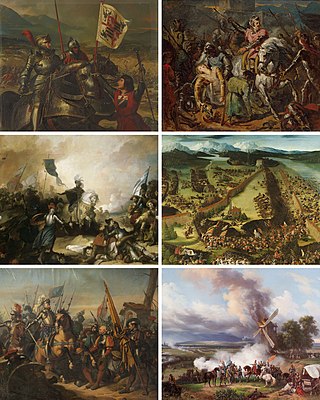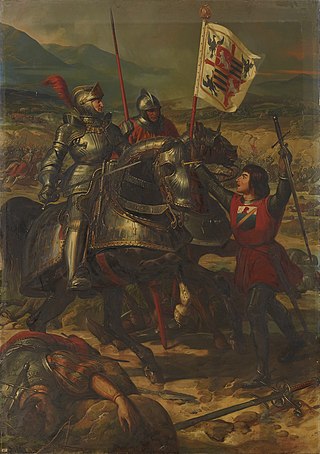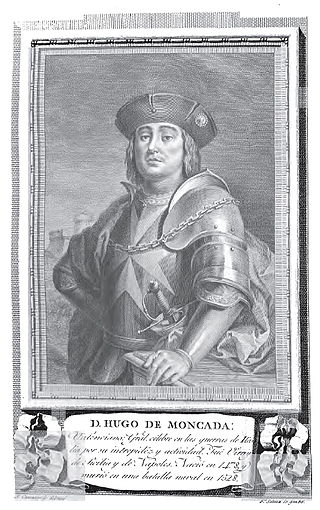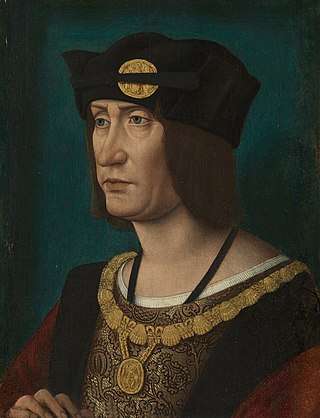Related Research Articles

Francesco I Sforza was an Italian condottiero who founded the Sforza dynasty in the duchy of Milan, ruling as its (fourth) duke from 1450 until his death.

Pope Alexander VI was head of the Catholic Church and ruler of the Papal States from 11 August 1492 until his death in 1503. Born into the prominent Borgia family in Xàtiva in the Kingdom of Valencia under the Crown of Aragon, Spain, Rodrigo studied law at the University of Bologna. He was ordained deacon and made a cardinal in 1456 after the election of his uncle as Pope Callixtus III, and a year later he became vice-chancellor of the Catholic Church. He proceeded to serve in the Curia under the next four popes, acquiring significant influence and wealth in the process. In 1492, Rodrigo was elected pope, taking the name Alexander VI.

The House of Sforza was a ruling family of Renaissance Italy, based in Milan. Sforza rule began with the family's acquisition of the Duchy of Milan following the extinction of the Visconti family in the mid-15th century and ended with the death of the last member of the family's main branch, Francesco II Sforza, in 1535.
Year 1494 (MCDXCIV) was a common year starting on Wednesday of the Julian calendar.

Charles VIII, called the Affable, was King of France from 1483 to his death in 1498. He succeeded his father Louis XI at the age of 13. His elder sister Anne acted as regent jointly with her husband Peter II, Duke of Bourbon until 1491, when the young king turned 21 years of age. During Anne's regency, the great lords rebelled against royal centralisation efforts in a conflict known as the Mad War (1485–1488), which resulted in a victory for the royal government.

The Italian Wars were a series of conflicts fought between 1494 and 1559, mostly in the Italian Peninsula, but later expanding into Flanders, the Rhineland and Mediterranean Sea. The primary belligerents were the Valois kings of France, on one side, and their opponents in the Holy Roman Empire and Spain on the other. At different points, various Italian states participated in the war, some on both sides, with limited involvement from England, Switzerland, and the Ottoman Empire.

The Battle of Fornovo took place 30 km southwest of the city of Parma on 6 July 1495. It was fought as King Charles VIII of France left Naples upon hearing the news of the grand coalition assembled against him. Despite the numerical advantage of their opponents, the French won the engagement and Charles was able to march his army out of Italy. It was nonetheless devoid of any strategic result as all of their conquests in the Italian Peninsula were abandoned. Fornovo was the first major pitched battle of the Italian Wars.

The Kingdom of Naples was a state that ruled the part of the Italian Peninsula south of the Papal States between 1282 and 1816. It was established by the War of the Sicilian Vespers (1282–1302), when the island of Sicily revolted and was conquered by the Crown of Aragon, becoming a separate kingdom also called the Kingdom of Sicily. This left the Neapolitan mainland under the possession of Charles of Anjou. Later, two competing lines of the Angevin family competed for the Kingdom of Naples in the late 14th century, which resulted in the death of Joanna I by Charles III of Naples. Charles' daughter Joanna II adopted King Alfonso V of Aragon as heir, who would then unite Naples into his Aragonese dominions in 1442.

The Duchy of Milan was a state in Northern Italy, created in 1395 by Gian Galeazzo Visconti, then the lord of Milan, and a member of the important Visconti family, which had been ruling the city since 1277.

The War of the League of Cambrai, sometimes known as the War of the Holy League and several other names, was fought from February 1508 to December 1516 as part of the Italian Wars of 1494–1559. The main participants of the war, who fought for its entire duration, were France, the Papal States, and the Republic of Venice; they were joined at various times by nearly every significant power in Western Europe, including Spain, the Holy Roman Empire, England, the Duchy of Milan, the Republic of Florence, the Duchy of Ferrara, and the Swiss.

Frederick, sometimes called Frederick IV or Frederick of Aragon, was the last king of Naples from the Neapolitan branch of the House of Trastámara, ruling from 1496 to 1501. He was the second son of Ferdinand I, younger brother of Alfonso II, and uncle of Ferdinand II, his predecessor.

Alfonso d'Este was Duke of Ferrara from 1504 to 1534, during the time of the War of the League of Cambrai.

The First Italian War, or Charles VIII's Italian War, was the opening phase of the Italian Wars. The war pitted Charles VIII of France, who had initial Milanese aid, against the Holy Roman Empire, Spain and an alliance of Italian powers led by Pope Alexander VI, known as the League of Venice.

The Italian Wars of 1499–1504 are divided into two connected, but distinct phases: the Second Italian War (1499–1501), sometimes known as Louis XII's Italian War, and the Third Italian War (1502–1504) or War over Naples. The first phase was fought for control of the Duchy of Milan by an alliance of Louis XII of France and the Republic of Venice against Ludovico Sforza, the second between Louis and Ferdinand II of Aragon for possession of the Kingdom of Naples.

Ascanio Maria Sforza Visconti was an Italian cardinal of the Catholic Church. Generally known as a skilled diplomat who played a major role in the election of Rodrigo Borgia as Pope Alexander VI, Sforza served as Vice-Chancellor of the Holy Roman Church from 1492 until 1505.

Francesco II Sforza was Duke of Milan from 1521 until his death. He was the last member of the Sforza family to rule Milan.

The Treaty of Granada (1500), signed on 11 November 1500, was a secret treaty between Ferdinand II of Aragon and Louis XII of France, in which they agreed to partition the Kingdom of Naples. Drawn up in the context of the wider Italian Wars, the disputes between the Hispanic Kingdoms and France led to the treaty's collapse in 1503.

Hugo de Moncada, was a Spanish political and military leader of the late 15th and early 16th century. He served as General of Ocean and Land, Viceroy of Sicily, 1509–1517, and Viceroy of Naples, 1527–1528.

Raymond Peraudi (1435–1505) was a French Augustinian, papal legate, and Cardinal. He was a perpetual traveler, engaging in diplomatic negotiations at various times for the pope, the emperor and the king of France. He was an effective administrator of territories belonging to the Roman Church. In his various assignments to preach indulgences for a Crusade or for the Jubilee of 1500, he became an early point of controversy in the dispute over the efficacy of indulgences, and the right of the pope to grant them.

The Treaty of Blois (1499), signed on 9 February 1499, was a secret military alliance between Louis XII of France and the Republic of Venice, in which they agreed to a joint attack on the Duchy of Milan. In return, the Venetians were to receive part of the Duchy, while France also undertook to provide military assistance if Venice was attacked by the Ottoman Empire.